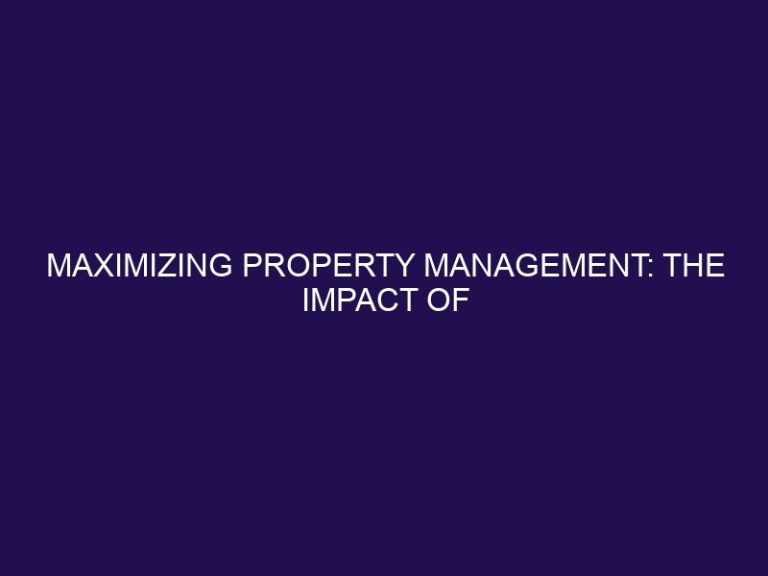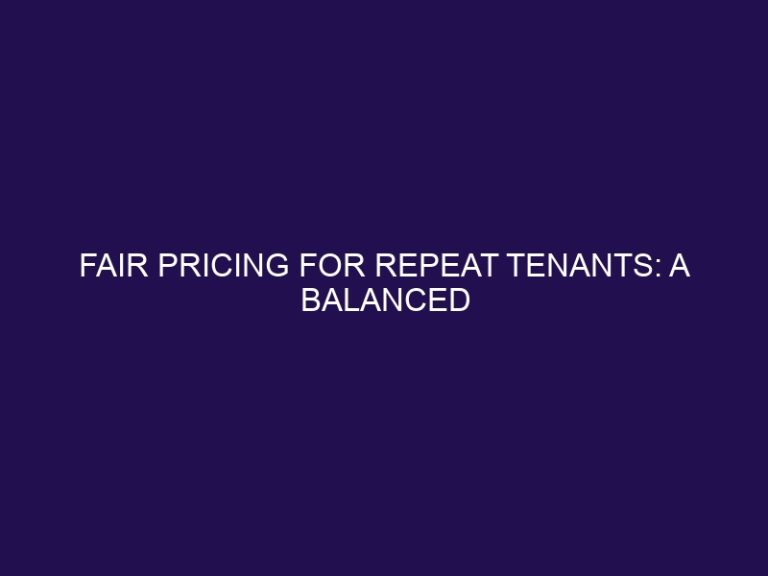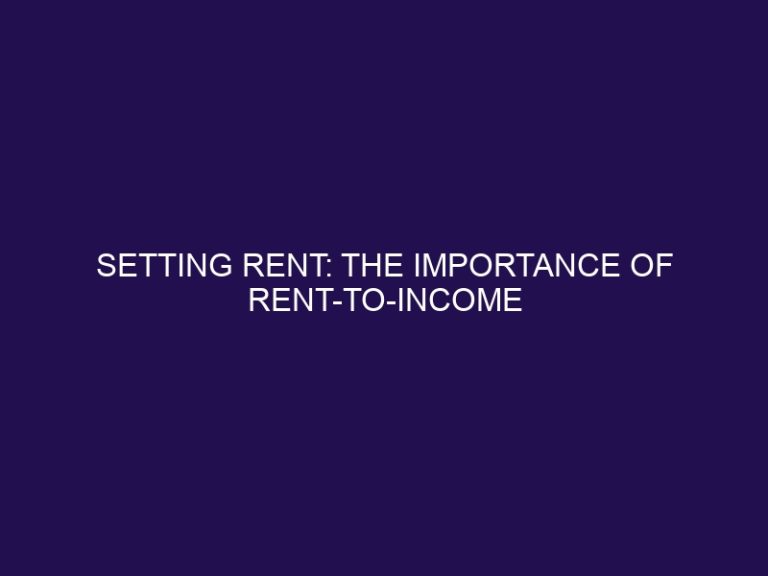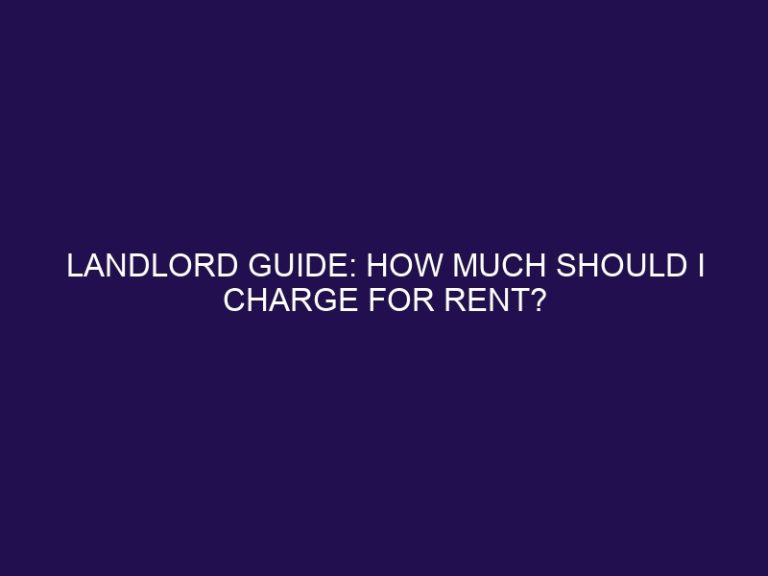How to Find Good Tenants in Canada
Finding good tenants is essential for landlords in Canada to maintain a profitable and hassle-free rental property. A good tenant is someone who pays rent on time, takes care of the property, and follows the rules and regulations set by the landlord. So, what qualities should landlords look for when searching for good tenants?
- Good Credit Score: A good credit score is an indication of a tenant’s financial responsibility and ability to pay rent on time.
- Steady Income: Tenants with a stable and sufficient income are more likely to pay rent consistently.
- Positive Rental History: Previous rental history can give insight into a tenant’s behavior and responsibility as a renter.
- Responsible and Reliable: Good tenants are responsible, reliable, and communicate effectively with the landlord.
Where can landlords find potential good tenants in Canada?
- Online Rental Platforms: Websites like Kijiji, Zillow, and Rentfaster allow landlords to list their properties and connect with potential tenants.
- Real Estate Agents: Real estate agents can help landlords find tenants and handle rental agreements.
- Referrals from Current Tenants: Current tenants can refer friends or family who they believe would be good tenants.
- Local Community Groups: Joining local community groups or posting in community bulletin boards can help landlords find tenants within the community.
When screening potential tenants, landlords should ask important questions such as:
- Why Are You Moving? This can give insight into the tenant’s rental history and reasons for moving.
- What is Your Income and Employment Status? This will help determine the tenant’s ability to pay rent.
- Can You Provide References from Previous Landlords? This will give a better understanding of the tenant’s rental behavior.
- Do You Have Any Pets? Landlords should be aware of any pets and their restrictions before renting out the property.
To ensure the quality of tenants, landlords can also conduct screening methods such as:
- Run a Credit Check: This will provide information on the tenant’s credit history and financial responsibility.
- Verify Income and Employment: Landlords can request pay stubs or contact the tenant’s employer to verify income and employment status.
- Contact Previous Landlords: Speaking with previous landlords can provide insight into the tenant’s rental history and behavior.
- Conduct a Background Check: A background check can reveal any criminal history or red flags.
Lastly, a well-written rental agreement is essential for both landlords and tenants. A rental agreement should include:
- Rent Amount and Due Date: Clearly state the amount of rent and when it is due.
- Lease Term and Renewal Options: Specify the length of the lease and any renewal options.
- Rules and Regulations: Clearly outline the rules and regulations that tenants must follow while living on the property.
- Security Deposit and Pet Policy: Include the amount of the security deposit and any pet policies.
By following these guidelines, landlords can find good tenants and ensure a successful and profitable rental property in Canada.
Key Takeaways:
What Makes a Good Tenant?
As a landlord in Canada, finding good tenants is crucial for maintaining a successful rental property. But what exactly makes a good tenant? In this section, we will discuss the key characteristics and qualities that make a tenant ideal. From having a good credit score and steady income to a positive rental history and being responsible and reliable, we will explore the various factors that contribute to a tenant’s desirability. By understanding what makes a good tenant, you can increase your chances of finding reliable and responsible renters for your property.
1. Good Credit Score
- Check credit score through authorized agencies like Equifax or TransUnion to ensure a good credit score.
- Set a minimum credit score requirement for potential tenants to have a good credit score.
- Consider factors beyond the credit score, such as debt-to-income ratio, to determine a good credit score.
- Ensure compliance with fair housing laws when using credit checks to assess a good credit score.
2. Steady Income
- Verify Employment: Request pay stubs or employment verification to confirm steady income.
- Check Stability: Assess longevity at current job for consistent earnings.
- Income-to-Rent Ratio: Ensure income meets the required rent-to-income ratio.
When evaluating a tenant’s income, it’s crucial to verify stability and adequacy to ensure consistent rent payments.
3. Positive Rental History
When considering potential tenants, a positive rental history is essential. It is important to look for a track record of consistent rent payments, adherence to lease terms, and respectful treatment of the property.
Furthermore, reaching out to rental references can offer valuable insights into the individual’s past behavior and reliability.
4. Responsible and Reliable
When searching for a suitable tenant, it is important to prioritize responsibility and reliability. Look for individuals who have a proven track record of meeting their obligations and demonstrating accountability, as these qualities are key indicators of a dependable tenant.
A property owner in Canada was able to find such a tenant, who not only paid rent on time but also took great care of the rental property, ensuring its longevity.
Where to Look for Good Tenants?
As a landlord, finding reliable and responsible tenants is crucial for the success of your rental property. But where do you start your search? In this section, we will discuss the various avenues you can explore to find good tenants in Canada. From online rental platforms to local community groups, we will explore the pros and cons of each option and help you determine which one may be the most effective for your specific property and location. Let’s dive in and discover the best ways to find quality tenants in Canada.
1. Online Rental Platforms
- Research online rental platforms such as Zumper or Rentfaster.
- Create compelling property listings with high-quality images and detailed descriptions.
- Utilize tenant screening services provided by these platforms for background and credit checks.
- Respond promptly to inquiries and schedule property viewings.
2. Real Estate Agents
- Partner with experienced real estate agents who specialize in rental properties.
- Clearly outline all criteria and preferences for potential tenants.
- Thoroughly review and screen potential tenant profiles.
- Leverage the expertise of real estate agents to negotiate rental terms and agreements.
When searching for reliable and responsible tenants, enlisting the help of reputable real estate agents with a proven track record in property management can greatly simplify the tenant selection process.
3. Referrals from Current Tenants
- Encourage satisfied tenants to refer potential renters.
- Provide incentives like rent discounts for successful referrals.
- Evaluate referred tenants according to standard screening criteria.
- Enhance tenant satisfaction and community with referral programs.
A landlord in Toronto received a reliable tenant through a referral from a current tenant, resulting in a long-term lease and a smooth rental experience.
4. Local Community Groups
- Engage with local community groups through social media or by checking local event listings.
- Take part in community meetings or events to connect with potential tenants.
- Promote rental listings in community group forums or newsletters.
- Ask for recommendations from community leaders or members who may know potential tenants.
What Questions to Ask Potential Tenants?
When screening potential tenants, be sure to inquire about:
- their rental history
- reason for leaving their previous residence
- employment status
- income
- references
- whether or not they have any pets
Additionally, asking about their lifestyle and habits can offer valuable insights into their suitability as tenants.
1. Why Are You Moving?
- Family size changes
- Job relocation
- Desire for different amenities
- Need for more space
Are you considering a move? There are many reasons why people choose to relocate, such as:
- Changes in family size
- Job relocation
- Desire for different amenities
- Need for more space
2. What is Your Income and Employment Status?
When screening potential tenants, it is important to ask about their income and employment status. This will help you understand their financial stability and ensure they are able to meet their rental obligations. A pro-tip is to verify the authenticity of any income documents provided to validate the information given.
3. Can You Provide References from Previous Landlords?
- Request references from previous landlords to assess tenant behavior and reliability.
- Contact former landlords directly to inquire about rent payment, property upkeep, and any issues.
- Ask about the tenant’s adherence to lease terms and their interaction with neighbors, including whether they can provide references from previous landlords.
- Consider the landlord’s feedback, including any references provided, in the tenant selection process.
4. Do You Have Any Pets?
When screening potential tenants, it is important to inquire about their pets. This includes asking about the size, breed, and behavior of their pets to ensure they are compatible with the rules and regulations of the rental property. It is also necessary to verify if there are any pet-related deposits or fees that may apply.
How to Screen Potential Tenants?
Finding the right tenants for your rental property is crucial for a successful and stress-free rental experience. Before handing over the keys, it is important to thoroughly screen potential tenants to ensure they are responsible and reliable. In this section, we will discuss the key steps in screening potential tenants, including running a credit check, verifying income and employment, contacting previous landlords, and conducting a background check. These measures will help you make an informed decision and find good tenants for your property in Canada.
1. Run a Credit Check
- Request Permission: Obtain written consent to run a credit check from the potential tenant.
- Use a Reporting Agency: Choose a reputable credit reporting agency to access the credit report.
- Review the Report: Analyze the credit report for red flags such as late payments or high debt levels.
- Respect Privacy: Safeguard the tenant’s sensitive financial information throughout the process.
Pro-tip: Engage with the tenant to explain the purpose of the credit check, fostering transparency and trust.
2. Verify Income and Employment
- Request proof of employment, such as pay stubs or an employment verification letter, to verify income and employment.
- Assess the income provided to ensure it meets the rental income requirement.
- Confirm the length of employment to check stability.
- Consider contacting the employer for further verification of income and employment.
3. Contact Previous Landlords
- Request contact information for the tenant’s previous landlords.
- Reach out to the landlords to gather information about the tenant’s rental history, punctuality with payments, and maintenance of the property.
- Inquire about any problems or grievances during the tenant’s stay.
- Record the feedback for evaluation of the tenant.
4. Conduct a Background Check
- Verify Identity: Obtain a government-issued ID to confirm the applicant’s identity.
- Evaluate Criminal Check for any criminal records to assess potential risks.
- Assess Financial Review credit reports and financial background to gauge financial responsibility.
- Contact 4. Conduct a Background Check
What to Include in a Rental Agreement?
Before renting out a property in Canada, it is essential to have a comprehensive rental agreement in place. This legally binding document outlines the terms and conditions of the rental agreement and helps protect both the landlord and the tenant. In this section, we will discuss the key elements that should be included in a rental agreement, including the rent amount and due date, lease term and renewal options, rules and regulations, and security deposit and pet policy. By including these details, landlords can find good tenants and ensure a smooth rental experience.
1. Rent Amount and Due Date
- Agree on the monthly rental amount and the due date for payment.
- Include any late fees or grace periods in the rental agreement.
- Specify the preferred method of payment, such as online transfers or checks.
- Clearly outline consequences for late or missed payments.
2. Lease Term and Renewal Options
- Consider offering flexible lease terms, including short-term or month-to-month options, to accommodate tenant needs.
- Include clear renewal terms in the agreement to outline procedures for extending the lease.
- Specify any conditions or rent adjustments for lease renewal in the agreement.
- Discuss potential lease extensions well in advance to allow for proper planning.
3. Rules and Regulations
- Familiarize yourself with the rules and regulations regarding landlords and tenants in your local area.
- Be sure to include clauses in the lease regarding maintenance responsibilities, noise levels, and subletting.
- Make sure to outline clear procedures for eviction and terms for lease termination.
- Pro-Tip: It is always wise to consult with a legal professional to ensure compliance with specific regional laws.
4. Security Deposit and Pet Policy
When entering into a rental agreement, it is important to clearly outline the security deposit and pet policy. This includes specifying the amount of the security deposit, the conditions for its refund, and any potential deductions. It is also crucial to establish rules regarding pets, including any fees, restrictions, and consequences for non-compliance.
Frequently Asked Questions
How important is income information when selecting tenants?
Income verification plays a crucial role in finding good tenants. Landlords should aim for rent to be approximately one third of a tenant’s income.
What are some potential red flags to look out for when screening tenants?
Landlords should be cautious of any potential tenants with a history of bad tenancy, little to no income or employment stability, and a low credit score.
What are the best ways to market a rental property to attract high quality tenants?
Using digital platforms and Canada’s top property listing websites, showcasing the property with professional photos or a virtual tour, and targeting specific demographics can help attract reliable tenants.
Is it necessary to use a real estate agent when finding tenants?
While it is not required, working with an experienced rental agent can provide insider knowledge, due diligence, and access to a wider audience through multiple listing services and brokerages’ websites.
What are some effective ways to screen potential tenants?
A full tenant screening should include checking credit references, rental history, employment and income information, and conducting background checks.
How can landlords protect themselves from potential issues with tenants?
Landlords can protect themselves by having a thorough lease agreement in place, conducting regular communication, and seeking legal advice when necessary. They can also consider guarantees such as a co-signer or security deposit.







